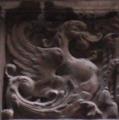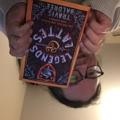Review of 'Babel' on 'Goodreads'
4 stars
It was good, really good. The characters were interesting and three dimensional and enjoyable, the setting and plot was engaging and high stakes, and the translation lectures were tailor made for language nerds like me.
However, don’t do like I did and go into this expecting a fantasy novel. This is, mostly, historical fiction with a magic system reskinning technological progress in Victorian England.
This is not a knock on it, though, saying that it’s superfluous; it has a very interesting, if specific effect on the reader’s relationship with the world. It moves all of the varied goods and services that imperial Britain used to maintain power over their colonies into one spot and one profession: Oxford translators. As I see it, the silver magic system mostly exists to move the political center of Britain into this area. And I enjoyed it if only for this facet, if not for …
It was good, really good. The characters were interesting and three dimensional and enjoyable, the setting and plot was engaging and high stakes, and the translation lectures were tailor made for language nerds like me.
However, don’t do like I did and go into this expecting a fantasy novel. This is, mostly, historical fiction with a magic system reskinning technological progress in Victorian England.
This is not a knock on it, though, saying that it’s superfluous; it has a very interesting, if specific effect on the reader’s relationship with the world. It moves all of the varied goods and services that imperial Britain used to maintain power over their colonies into one spot and one profession: Oxford translators. As I see it, the silver magic system mostly exists to move the political center of Britain into this area. And I enjoyed it if only for this facet, if not for all the other symbolism it brings to the table.
However, I think it’s easy to be misled as a reader, that you will be seeing imaginative “what if?”s that are the bread and butter of alternate history fantasy novels.
To sum up, I recommend giving this novel a try if you are at all interested in Victorian England, in translation/linguistics, or just enjoy a really good, tragic, character driven story.




